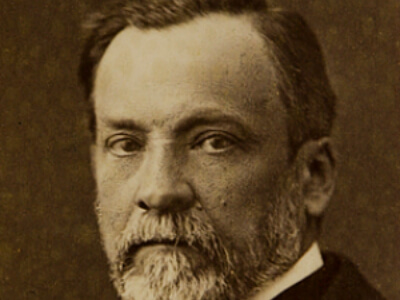190th anniversary of the birth of Louis Pasteur - the pioneer of medical microbiology

Louis Pasteur was born on 27.12.1822 to a poor family that lived in a village in eastern France. As a child he was not a particularly bright student, but he excelled in painting and drawing. However, with the encouragement of the school principal, he turned to academic studies, at the age of 20 he received a bachelor's degree in science, and turned to doctoral studies in chemistry at the Ecole Normale in Paris. He specialized in the study of crystals, and shortly after his studies he discovered the principle of chirality - many biological substances actually consist of two forms of almost identical molecules, but in terms of their spatial arrangement they are actually a mirror image of each other. This finding is of enormous importance in understanding biochemical processes, and the discovery earned him a position as professor of chemistry at the University of Strasbourg.
There, Pasteur studied fermentation processes, and discovered the involvement of microorganisms - bacteria and fungi - in these processes. In a series of brilliant experiments, he refuted the explanation that was accepted at the time, that these microorganisms are created from nothing, and proved that living beings are created only from other life (or in the Latin formulation - omne vivum ex vivo - all living things are created from living things). He also discovered that fungi and bacteria are the causes of the sourness of drinks, and developed the disinfection process through gentle heating, a process now called after his name - pasteurization.
After using the pasteurization process to save the wine, beer and vinegar industries, Pasteur was called upon to save the French silk industry as well, and find out what causes the death of silkworm larvae. He managed to isolate the cause of the disease, and after three years of research he also found ways to overcome it.
life saver
Pasteur, meanwhile appointed as a senior researcher at the "Ecole Normale" in Paris, understood the enormous importance of microorganisms not only in the beverage and silk industry, but also in causing disease. He managed to convince the French army to sterilize the medical equipment and dressing materials, and brought about a real decrease in the mortality of the wounded in the German-French war. Thanks to this contribution, he was appointed a member of the French Academy of Medicine - a rare achievement for someone who does not have a medical education.
In the 70s of the 19th century, Pasteur began to engage in real medical research. He developed a vaccine for animals against anthrax and cholera, then moved on to develop a vaccine for rabies. This development is much more complex, because the cause of the disease is a virus, not a bacterium, and it is much more difficult to grow it in the laboratory. After five years of research, the vaccine was tested on a nine-year-old boy who had been bitten by an infected dog, and Pasteur's series of injections saved his life. His achievements in the field of vaccination made Pasteur a national hero, and in 1888 a research institute bearing his name was established for him in Paris. His 70th birthday was declared a national holiday in France. Pasteur died in 1895, after a series of cerebrovascular events. He was buried in the cellars of the institute that bears his name in Paris. Since then, the institute continues to serve as a model for excellence in scientific research, especially with a medical emphasis. Pasteur's own name is immortalized in many places around the world.
The article was originally published on Itai Nebo's "HaMaor Haketat" blog on December 27, 2012

3 תגובות
safkan very true
You probably mean the brucella bacteria, which cause brucellosis if milk is not pasteurized before consumption.
One of the biggest
Of blessed memory
You need to save his DNA and in time to produce a clone of him
(Am I crazy?)
You forgot pasteurizing the milk. Pasteurization of milk is probably more important than pasteurization of wine, beer and vinegar, this is because milk from cows and sheep is a mandatory drink for the masses; Without the pasteurization of the milk, the milk drinkers are exposed to infectious diseases spread by the cows, sheep and goats.